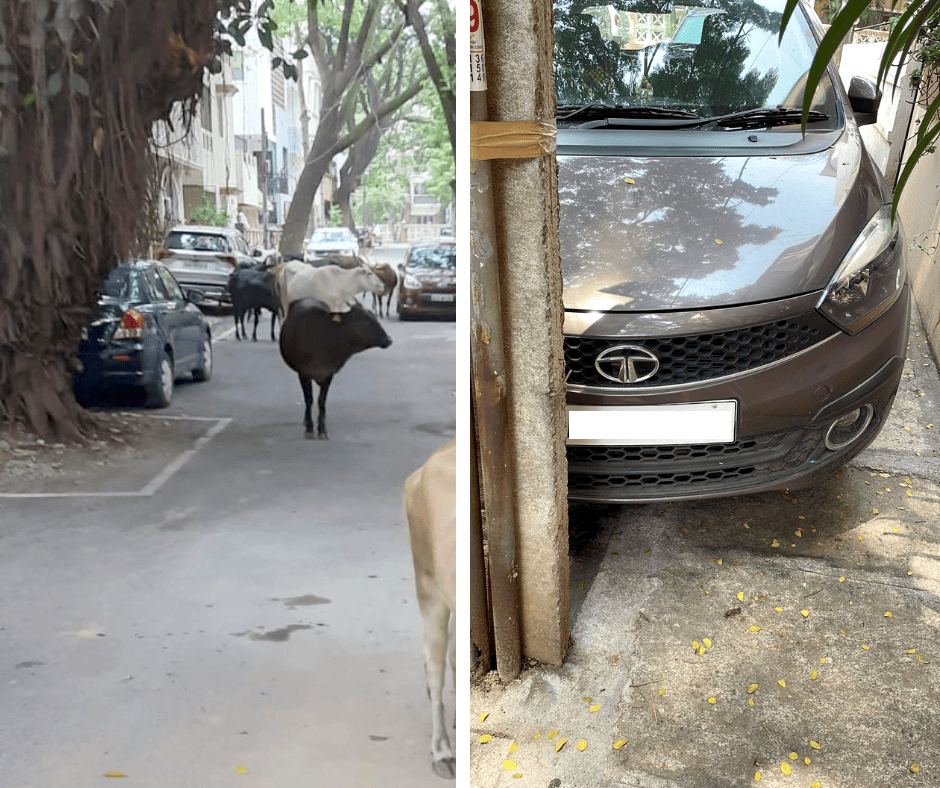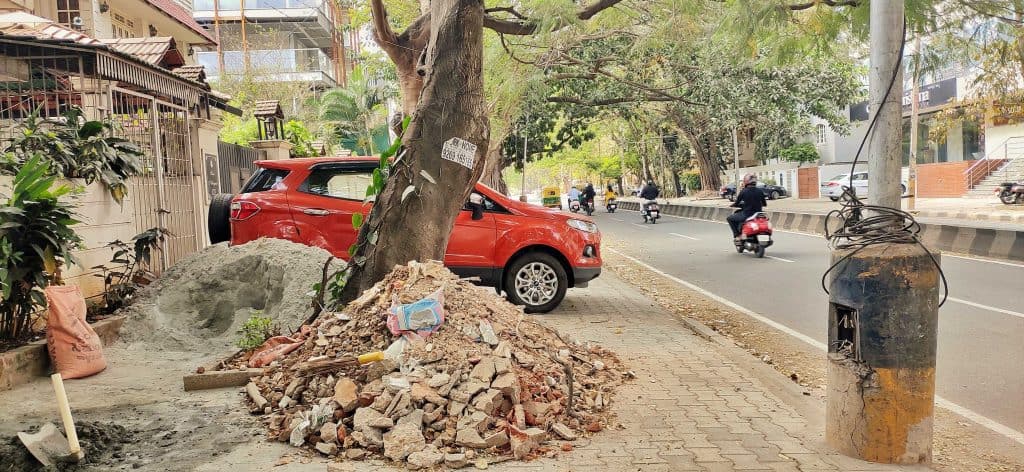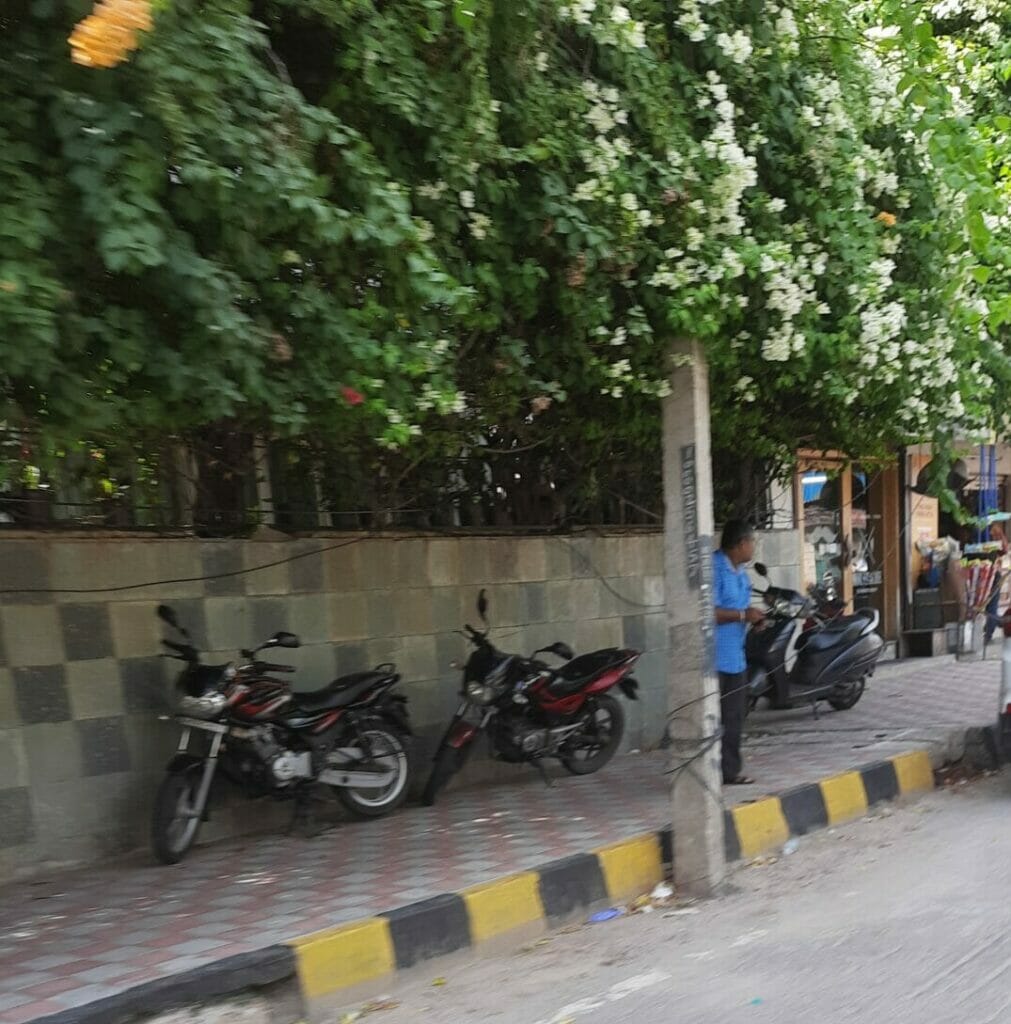Crowding and congestion on Bengaluru roads push pedestrians to the narrow, potholed and often non-existent footpaths. Footpaths are one of the most critical prerequisites for a more liveable Bengaluru, but they continue to be a neglected priority. A large number of citizens who die in road accidents are pedestrians. With an increasing number of pedestrian deaths, it becomes imperative to address the lack of walkable footpaths and the necessity to maintain them.
Vehicles on footpaths
Of all the issues plaguing footpaths in Bengaluru, the most prominent is the indiscriminate parking of vehicles. Parking of two-wheelers on footpaths has been a nuisance for quite some time, but it’s not just that. Riders also put the lives of pedestrians at peril when they ride on the footpath to avoid traffic jams.

Commonly seen encroachments
In many instances, footpaths are encroached by house owners, who extend their gates to create garden spaces. Apart from that, restaurants and eateries, under the pretext of having open spaces to attract citizens to sit out and enjoy the outdoors, take over footpaths. Construction and building projects always lead to debris disposed of on the adjoining footpaths, as they become home to dumping utility materials like pipes, wires, broken slabs and poles. In some places, the footpaths are piled with garbage.
Functions, festivals and celebrations are also held on footpaths and shamianas are erected. Vehicles are parked on the footpaths, with two-wheelers also trying to cut traffic. Cars are parked half on the road and half on the footpath. Adding to this, broken pedestrian infrastructure has compromised the safety and mobility of citizens across the city. As a result of these inconveniences, pedestrians are unable to use footpaths.
Statistics on cases
In 2022, the Bengaluru traffic police registered more than 1.4 lakh cases in connection with parking of vehicles on footpaths. This is an 87% increase from 2021. The concerning trend appears to continue in 2023 as well; till the month of May, Bengaluru traffic police had already booked 28,544 cases for parking on footpaths and 3,100 cases for driving on footpaths.

Read more: 44% of those who died on Bengaluru’s roads in 2017 were pedestrians
What the law says
Haphazard parking menace is clearly on the rise in Bengaluru, with people parking vehicles wherever they please. The law, however, clearly prohibits such a practice:
- Regulations framed under the Motor Vehicles Act, 1988 lay down that no vehicle shall be parked on a footpath, emphasising that if a vehicle is stopped or parked on a footpath, it will cause inconvenience to the users of the footpath.
- Indiscriminate parking on footpaths is a public nuisance within the meaning of Section 268 of the Indian Penal Code, which prohibits the parking of vehicles on footpaths. While road space is owned by the Municipal Corporation and parking management is the corporation’s function, enforcement of parking rules in Bengaluru is done by the traffic police as per the provisions of the Karnataka Police Act,1963.
Evidently, the laws relating to footpaths and public streets are rarely effectively implemented.

Read more: Bengaluru’s deadly footpaths: Children, elderly at high risk
Protecting footpaths: What courts in India have said
- The Karnataka High Court in 2021 stated that the right to have streets, including footways in a good and reasonable condition, will have to be held as an essential part of the fundamental rights conferred on the citizens under Article 21 (Right to Life) of the Indian Constitution.
- In another PIL, heard in 2021, the Karnataka High Court held that the State Government must ensure compliance with penal provisions of the Motor Vehicles Act. Rules, Regulations, framed under the above Act and the Indian Penal Code must be scrupulously implemented. In instances of violation, criminal law should be set into motion against offenders—those who obstruct footpaths, public streets and bicycle tracks, and cause inconvenience to others by parking vehicles indiscriminately.
- The court also observed that laws relating to footpaths and public streets are seldom implemented in the state. Despite the traffic police deciding to increase surveillance and take strict action against those who park on footpaths, nothing has really changed. Currently, the traffic police fine violators under Section 283 of the Indian penal code for parking on footpaths or at any other no-parking zones.
- Previously, the court held that it is the statutory obligation of the municipal corporation to construct, repair and maintain footpaths to ensure the good condition of roads. The definition of ‘public street’ under the Karnataka Municipal Corporations Act, 1976 includes a ‘footway’. Even under the Bruhat Bengaluru Mahanagara Palike Act, 2020, the definition of ‘street’ includes any footway, subway or riding path or passage over which the public have a right of passage or access. Therefore, urban local bodies have the statutory obligation to prevent encroachment of footpaths and to maintain them in a good condition.
- In 2023, the Karnataka High Court also heard a PIL that called out the grave danger to human lives from the existence of electrical installations on roads/footpaths; it claimed that these actually constitute human rights violation. The Bangalore Electricity Supply Company (BESCOM) informed the High Court that 1,554 transformers had either been relocated from the footpaths or replaced with new spun pole structures in the city, adding that the remaining 1,033 transformers will be relocated by September 2023. It is yet to be seen whether this does materialise.
Our responsibility as responsible residents & citizens is:
1. Identify the real requirements of vehicles in our home. Sometimes we have multiple cars with no actual requirement for them.
2. Do we have car parking space allocated within our compound?
3. Are we parking cars outside on footpath just because we are lazy to put them inside the gate?
4. Do we object to our immediate neighbours who park cars in the footpath & blocking way of pedestrians?
5. Can we ensure from our side at least to park cars inside our compound & take them out only when needed.
It requires a little bit of effort to discipline ourselves & have awareness on how it endangers pedestrians who are forced to walk on the road because of our “Don’t care attitude”.
BBMP need to incorporate parking allocation by any business for Issue of Trade Licence depending on size & type of Business. Trade Licence should be issued only after inspecting the Business Location by the Health Inspector & by endorsement of 3 RWA members.
Commercialisation of Residential Layouts must be Strictly Denied and must be the responsibility of Town Planning Dept of BBMP.
Most of the footpaths are either entirely or partially encroached by the shopkeepers by putting their saleable items in display. The all stretches in & around Horamavu Signal (Near Jayanthi Nagar BBMP Office) and footpaths in nearby areas are encroached by these shopkeepers. The pedestrians are bound to walk on roads. Witnessed many accidents where pedestrians hit by motorcyclists and in many cases, motorcyclists are not the culprits. The real culprits are shopkeepers who extended their shops to footpaths. And all these happening in the presence of the BBMP, Traffic Police and Police departments. But no one worries to clear all these illegal encroachments.
There is “Public Eye” app where you can report such parking on footpath by vehicles, by attaching the photo taken on the mobile phone. Any citizen can report in that app. Then there will be fine imposed by the Bangalore Traffic Police. It is easy to take photo of such parking, unlike taking a photo of some vehicle jumping the traffic signal. If many citizens report then this parking menace can be curbed.